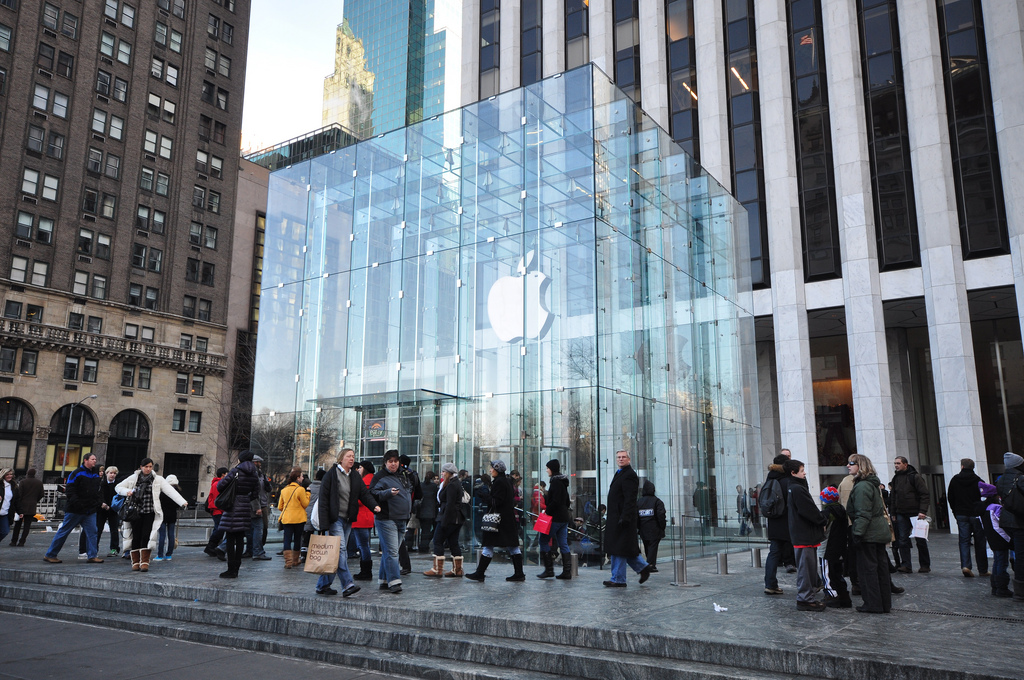Apple recently announced that it would be bringing home the bulk of its overseas funds, which happens to be the largest of any U.S. company. This would involve paying $38 billion in taxes, but it seems the company doesn’t really care. It wants to basically use that money to fund the creation of American jobs via local manufacturing, as well as data centers.
The Cupertino firm is looking at creating about 20,000 new jobs in the future, which will be available at existing sites as well as a new campus that it is planning to open. This news caused the company’s shares to rise by 1.7 percent, which placed its value at $179.10, Bloomberg reports.
According to Apple CEO, Tim Cook, this investment is intended to prove that the company is focusing “in areas where we can have a direct impact on job creation and job preparedness.” This basically made Apple the first major U.S. company to act on the recent tax cuts in a way that directly influenced the country’s economy and employment numbers.
Other firms, such as major U.S. carriers simply celebrated the event by issuing bonuses to their employees, and no doubt to their executives. As Erik Gordon, a professor at the University of Michigan’s Ross School of Business told the publication, Apple’s decision to add more jobs to the U.S. could serve to provide President Donald Trump with the political points that he currently sorely needs.
“The thrust here is American jobs, jobs on American soil, build manufacturing here, don’t build everything in China,” Gordon said. “You can’t have an announcement of a million jobs. But you can have companies like Apple saying that we’re going to have 20,000 new jobs here. If other companies say they’re going to have new jobs too, it does add up.”



 Nvidia, ByteDance, and the U.S.-China AI Chip Standoff Over H200 Exports
Nvidia, ByteDance, and the U.S.-China AI Chip Standoff Over H200 Exports  Google Cloud and Liberty Global Forge Strategic AI Partnership to Transform European Telecom Services
Google Cloud and Liberty Global Forge Strategic AI Partnership to Transform European Telecom Services  Sony Q3 Profit Jumps on Gaming and Image Sensors, Full-Year Outlook Raised
Sony Q3 Profit Jumps on Gaming and Image Sensors, Full-Year Outlook Raised  AMD Shares Slide Despite Earnings Beat as Cautious Revenue Outlook Weighs on Stock
AMD Shares Slide Despite Earnings Beat as Cautious Revenue Outlook Weighs on Stock  Global PC Makers Eye Chinese Memory Chip Suppliers Amid Ongoing Supply Crunch
Global PC Makers Eye Chinese Memory Chip Suppliers Amid Ongoing Supply Crunch  Anthropic Eyes $350 Billion Valuation as AI Funding and Share Sale Accelerate
Anthropic Eyes $350 Billion Valuation as AI Funding and Share Sale Accelerate  OpenAI Expands Enterprise AI Strategy With Major Hiring Push Ahead of New Business Offering
OpenAI Expands Enterprise AI Strategy With Major Hiring Push Ahead of New Business Offering  Oracle Plans $45–$50 Billion Funding Push in 2026 to Expand Cloud and AI Infrastructure
Oracle Plans $45–$50 Billion Funding Push in 2026 to Expand Cloud and AI Infrastructure  SpaceX Prioritizes Moon Mission Before Mars as Starship Development Accelerates
SpaceX Prioritizes Moon Mission Before Mars as Starship Development Accelerates  SpaceX Seeks FCC Approval for Massive Solar-Powered Satellite Network to Support AI Data Centers
SpaceX Seeks FCC Approval for Massive Solar-Powered Satellite Network to Support AI Data Centers  Nvidia Nears $20 Billion OpenAI Investment as AI Funding Race Intensifies
Nvidia Nears $20 Billion OpenAI Investment as AI Funding Race Intensifies  Tencent Shares Slide After WeChat Restricts YuanBao AI Promotional Links
Tencent Shares Slide After WeChat Restricts YuanBao AI Promotional Links  TSMC Eyes 3nm Chip Production in Japan with $17 Billion Kumamoto Investment
TSMC Eyes 3nm Chip Production in Japan with $17 Billion Kumamoto Investment  Jensen Huang Urges Taiwan Suppliers to Boost AI Chip Production Amid Surging Demand
Jensen Huang Urges Taiwan Suppliers to Boost AI Chip Production Amid Surging Demand  SoftBank Shares Slide After Arm Earnings Miss Fuels Tech Stock Sell-Off
SoftBank Shares Slide After Arm Earnings Miss Fuels Tech Stock Sell-Off 































